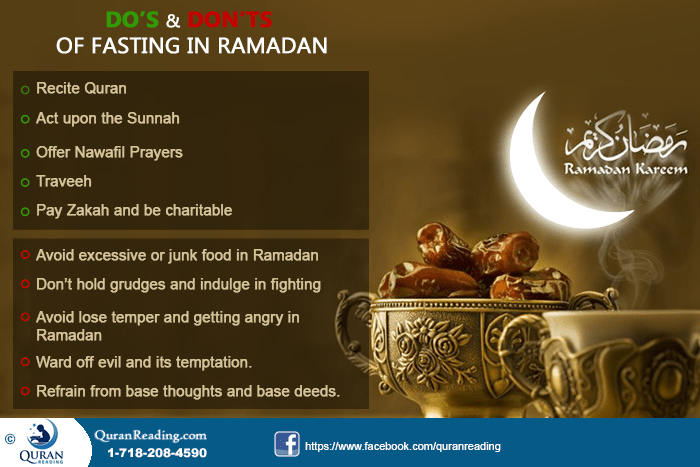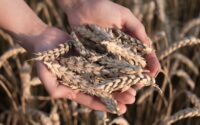
Essential Do’s and Don’ts for Muslims during Fasting in Ramadan

Ramadan is a blessed month that increases a Muslim’s spiritual awareness, strengthens the worshiper’s connection with Allah (SWT), and reminds us our duties towards the needy people who are living in the community. It also reminds us of our own need for an increase in faith, asking Allah Almighty for mercy and forgiveness. The Holy month Ramadan is just about to start. Muslims anxiously waiting for this prosperous month in which they pray and praise Allah Almighty and receive greater blessings and rewards in return.
Muslims fast from the beginning of the day from dawn to dusk refraining from any kind of drinking and eating. Our beloved Prophet Muhammad (SAW) said related to Ramadan in these words: “When the month of Ramadan starts, the gates of the heaven are opened and the gates of Hell are closed and the devils are chained” (Bukhari). Ramadan is the month of forgiveness and blessings. There are things which Muslims needs to avoid and to do in Ramadan. Below we will discuss the major do’s and don’ts that Muslims should know about during fasting in Ramadan.

Do’s
Do’s are the action that we should do during fasting and our beloved Prophet Muhammad (SAW) was keen on doing during Ramadan.
- Rushing to breaking the fast as soon as one is certain that sunset has commenced is recommended.
- When the call for Maghreb prayer is heard, break your fast with few dates, or fruit, juice, and any other thing before praying the Maghreb.
- Recite the Quran in Ramadan excessively. Ramadan is the greatest opportunity to communicate with Allah Almighty because there are no barriers man and His Lord. So reestablish ties with Him and recite Quran as much as you can.
- Follow the Sunnah of Prophet Muhammad (SAW) in order to reap the benefits of this Holy Month. Following the best of the human beings who is none other than Holy Prophet (PBUH) will surely make us a better person and even better role model as Muslims in good faith.
- Taraweeh prayer is another essential element of this Holy month in addition to the five daily prayers. Taraweeh prayers are to be performed after Isha prayer each day to create a stronger bond with Allah Almighty and to gain the blessings of Allah (SWT).
- Give charity or Zakat in this Holy Month as we know Ramadan is all about helping others and feeling their pain. So, be aware of those who need your help and give Zakat because it not only fulfills your rights towards the Lord but also towards His creation.
- To better understand Ramadan, ask Muslim friends if you could join them for the Having a meal together is always a good opportunity to bond with and get to know a person.
Don’ts
Don’ts are the actions that we should avoid during fasting in the Holy Month of Ramadan.
- Avoid blood cupping, blood withdrawal, and using ear drops or inhalers while fasting.
- Do not listen to music because your heart should be occupied with supplication, remembrance of Allah, and the Holy Quran, not with songs.
- Do not waste your time. The days and nights of Ramadan are too precious to be wasted away watching TV, going on shopping, oversleeping, and other useless activities.
- Do not engage in idle talk, gossip, lying, quarreling, cursing, or any form of speech that is unnecessary and has no benefit. The Prophet (SAW) said, “Whoever does not give up false speech and acting upon it, Allah has no need of him giving up his food and drink.” (Al-Bukhari)
- Fasting gives the lesson of sacrifice and forgiveness; hence, during Ramadan, a Muslim must not hold grudges and indulge in fighting people. Start forgiving people and whatever little mistakes people commit try to be tolerant and forgiving towards them.
- Another thing that fasting in Ramadan teaches is tolerance and patience. Getting angry during Ramadan is one thing that a Muslim must try to avoid and increase patience and tolerance.
- Don’t refuse an Iftar when invited if it’s possible. In fact, organize your own Iftar for your friends and family members.
In nutshell, it is imperative to do good deeds and refrain from evil and sinful deeds as well as thoughts so that the true purpose of fasting is achieved. Once a Muslim is able to refrain from the bad and starts doing good, then the practice in Ramadan can be carried on to the rest of the year as well, which is the true purpose of this Holy Month.




